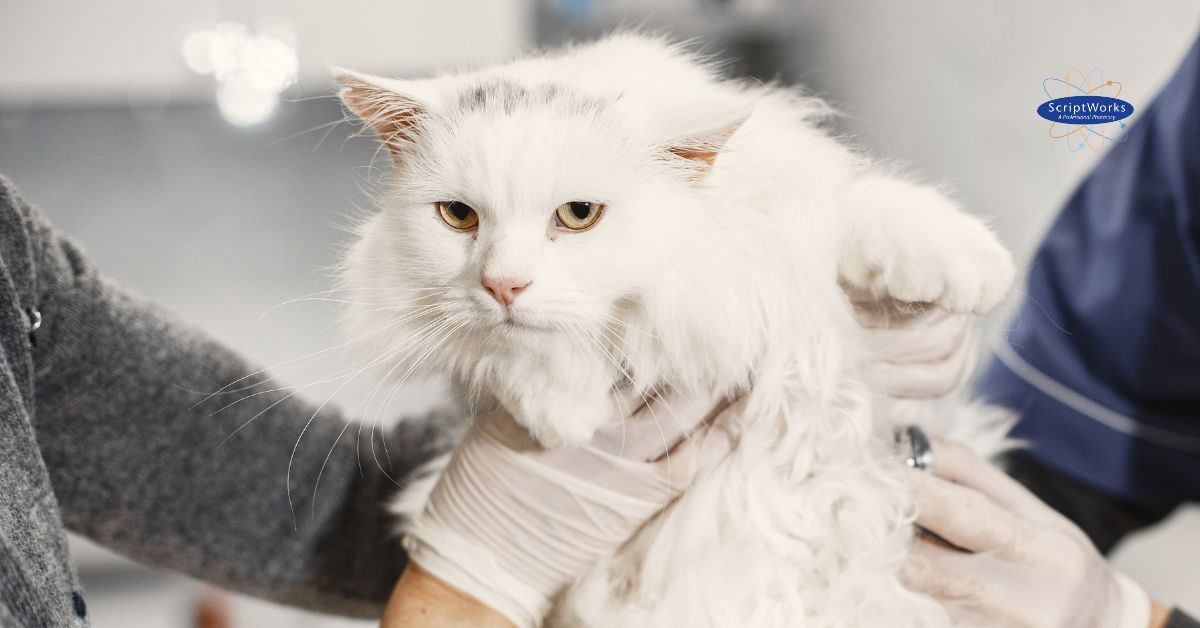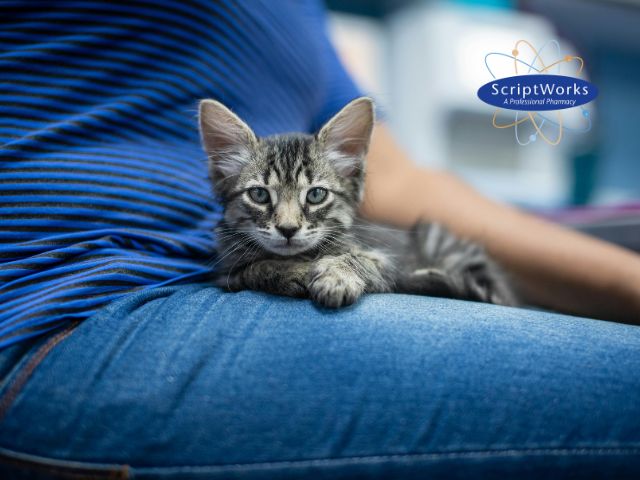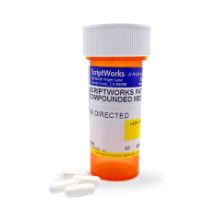
Author: Bob Brensel | President, Pharmacist | ScriptWorks
Bob Brensel, RPh, earned his Pharmacy Degree at University of the Pacific in Stockton, California in 1980. Former California Pharmacists Association’s Award Winner for Recognition of Outstanding Achievement in Compounding Pharmacy. Read More →
Feline Infectious Peritonitis: How GS-441524 is Changing the Outlook for Cats in California
For decades, a diagnosis of feline infectious peritonitis (FIP) was considered a terminal prognosis. Veterinarians and cat owners were faced with heartbreaking choices, as options for addressing the often fatal disease were limited. However, recent advancements in veterinary antiviral therapy have changed the landscape dramatically. At the center of this transformation is GS-441524, a potentially powerful compound now available at ScriptWorks Pharmacy in Walnut Creek, California.
As a trusted California veterinary compounding pharmacy, ScriptWorks is committed to providing veterinarians and pet owners with high-quality, life-saving options. With compounded GS-441524 capsules, we proudly support the fight against feline infectious peritonitis in cats across the Bay Area and beyond.
What is Feline Infectious Peritonitis (FIP)?
Feline infectious peritonitis (FIP) is caused by a mutation of the feline coronavirus (FCoV), a common virus that often resides harmlessly in the intestinal tract of cats. In rare cases, this virus mutates into a virulent form that can spread throughout the body and trigger a severe immune-mediated inflammatory response. This is especially seen in young cats, those living in multi-cat households, or cats experiencing stress or immunosuppression.
FIP presents in two main forms: Wet FIP and Dry FIP
Wet (effusive) FIP: Characterized by the accumulation of fluid in the abdomen or chest, often leading to breathing difficulties and a swollen belly. This form tends to progress rapidly.
Dry (non-effusive) FIP: A less obvious but equally dangerous form that causes inflammation in various organs such as the liver, kidneys, eyes, or brain. Symptoms may include neurological signs, weight loss, lethargy, jaundice, or eye problems.
Left unaddressed, both forms of FIP are almost always fatal. Until recently, the only option for most cat owners was palliative care.
GS-441524: A Game-Changer in FIP Therapies
In recent years, GS-441524 has emerged as a groundbreaking medication for feline infectious peritonitis. GS-441524 is an antiviral nucleoside analog and the active metabolite of remdesivir, a drug used in human medicine to address certain viral infections. GS-441524 works by inhibiting viral replication at the cellular level, giving the cat’s immune system a chance to fight back against the virus.
Studies and real-world clinical experience have shown that GS-441524 therapy has led to remission in a high percentage of cats diagnosed with FIP.
“Thousands of cats around the world now go on to live normal, healthy lives following the full therapy protocol.”
Why Choose Compounded GS-441524 from ScriptWorks Pharmacy?
At ScriptWorks Pharmacy, we specialize in custom veterinary compounding, offering medications tailored to the specific needs of each patient. We provide GS-441524 in oral capsule form, compounded with precise dosing to support outcomes.
Veterinarians and pet owners choose ScriptWorks because of our:

Our pharmacists are experienced in formulating medications for a wide range of animal health conditions, including complex and off-label therapies like GS-441524. We work closely with veterinarians to ensure that each compounded prescription meets the highest standards for accuracy, purity, and consistency.

We understand the urgency of addressing feline infectious peritonitis. That’s why we offer fast prescription fulfillment and shipping options to get GS-441524 capsules where they’re needed — whether that’s a local clinic in Walnut Creek or a pet owner across California.

At ScriptWorks, we believe in compassionate care. We’re here to answer questions, support veterinarians, and ensure that every pet receives the best possible chance at recovery.
A Trusted Partner for Veterinarians Addressing FIP
Veterinarians in Walnut Creek and throughout the Bay Area turn to ScriptWorks Pharmacy for access to high-quality, compounded medications like GS-441524. We partner with veterinary professionals dedicated to advancing feline care, offering a dependable supply chain and expert compounding services.
If you are a veterinarian with a cat patient with feline infectious peritonitis, ScriptWorks may help by:
- Providing easy prescription submission for compounded GS-441524
- Ensuring fast turnaround times for urgent cases
- Offering pharmacist consultations when needed
Scriptworks is an accredited compounding pharmacy for animals currently serving all of California including: Walnut Creek, Concord, Martinez, San Francisco, Oakland, Berkeley, Danville, Lafayette, Alamo, Marin County, Mill Valley, Santa Rosa, San Rafael, Tiburon, Corte Madera, Sausalito, Novata, Larkspur, San Anselmo, Fairfax, Ross, Kentfield, Ross, and every city statewide with prescription.
We are also proud to support shelters, rescue organizations, and feline specialists seeking medication options for at-risk cats in their care.
What Pet Owners Should Know About FIP and GS-441524
If your cat has been diagnosed with feline infectious peritonitis, it’s important to act quickly.
FIP is a progressive disease, and early intervention can significantly improve outcomes. Therapies with GS-441524 typically involve daily oral capsules for a period of 12 weeks, under veterinary supervision. While therapies can be intensive, many cat owners report a noticeable improvement in symptoms within the first few weeks.
Does an animal need medicine now?
SCRIPTWORKS DELIVERS.
Animals can't wait around weeks for medications.
Get prescriptions when they need them.

Weekday Local Deliveries
Walnut Creek, Concord, Martinez, San Ramon, Danville, Alamo, Lafayette and Orinda.
USPS 1st Priority Mail Overnight Mail Delivery
California (state-wide)
Always consult a licensed veterinarian to confirm the diagnosis and determine whether GS-441524 is appropriate for your cat. ScriptWorks will then work with your veterinarian to compound and dispense the correct formulation and dosage.
Providing Veterinary Compounding in the Bay Area and Beyond
ScriptWorks Pharmacy proudly serves the East Bay, and all of California. We are licensed to ship throughout the state, ensuring cats with FIP can access GS-441524 wherever they are.
We are committed to staying at the forefront of veterinary medicine and providing access to emerging therapies that help improve animal health and quality of life.
Contact ScriptWorks Pharmacy today!
If you’re a veterinarian, pet owner, or animal welfare organization seeking access to GS-441524 for addressing feline infectious peritonitis, ScriptWorks Pharmacy is here to help. Our goal is to support the feline community with safe and compassionate care — because every cat deserves a chance to heal. Get in touch with us now to better serve your furry patient population.
References
Addie, D., Belák, S., Boucraut-Baralon, C., Egberink, H., Frymus, T., Gruffydd-Jones, T., … & Horzinek, M. C. (2009). Feline infectious peritonitis. ABCD guidelines on prevention and management. Journal of Feline Medicine & Surgery, 11(7), 594-604. Link
Coggins, S. J., Norris, J. M., Malik, R., Govendir, M., Hall, E. J., Kimble, B., & Thompson, M. F. (2023). Outcomes of treatment of cats with feline infectious peritonitis using parenterally administered remdesivir, with or without transition to orally administered GS‐441524. Journal of Veterinary Internal Medicine, 37(5), 1772-1783. Link
Murphy, B. G., Perron, M., Murakami, E., Bauer, K., Park, Y., Eckstrand, C., … & Pedersen, N. C. (2018). The nucleoside analog GS-441524 strongly inhibits feline infectious peritonitis (FIP) virus in tissue culture and experimental cat infection studies. Veterinary microbiology, 219, 226-233. Link
Tekes, G., & Thiel, H. J. (2016). Feline coronaviruses: pathogenesis of feline infectious peritonitis. Advances in virus research, 96, 193-218. Link



